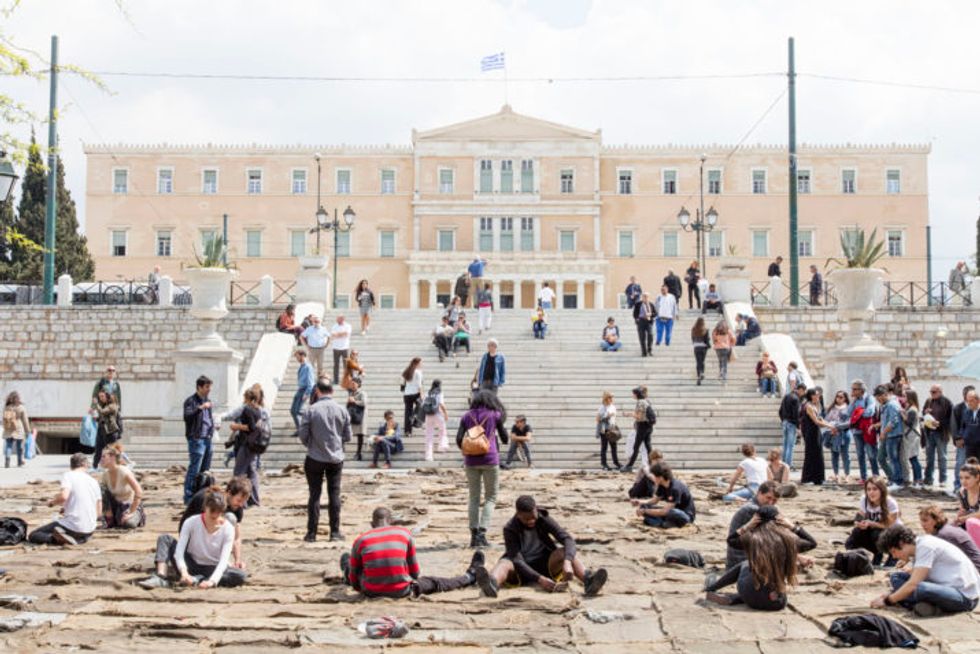Weekend Reading—Behind Ibrahim Mahama’s Fragments at London’s White Cube Gallery, Part 1
The star Ghanaian visual artist continues his meteoric rise with a new show at one of London’s top galleries

Editors Note: OkayAfrica’s UK correspondent, Sabo Kpade, gets deep with Ibrahim Mahama for our first edition of Sunday Reading. This is part 1 of 4.
For his first solo exhibition in the UK titled "Fragments," Ibrahim Mahama has made, among other things, a colossal structure called Non Orientable Nkansa made of cobbler’s boxes that have been broken down and reassembled.
This continues his investigation into the life cycle of materials which I first came across at Saatchi Gallery’s “Pangaea” exhibition in 2014, a broad survey of art from Africa and Latin America.
Of the many works from such a diverse group of artist, Mahama’s installation stood even farther afield on account of being simple and imposing in a huge dim-lit space with its walls draped with jute sacks.
Several physical factors—ambience, contrast of one’s size to the high-ceilinged space, how unadorned it was (despite being a drape)—combined to make a big impression.
Ghana is the world’s second largest producer of cocoa and these jute sacks, made in Southeast Asia, are used to transport the produce, after which its use multiplies to include storing and transporting grains, and other utilities.
The works for Pangaea were untitled or called “untitled.” Three years later and on show at White Cube, the newer ones have distinct names - Gemtun Boxe and Issaka Bob - less imposing than the previous ones, but no less impressive.
Other works include a wall of birth certificates and a 15 minute video installation of his collaborators as they execute the tasking job of stitching together and covering with sacks Ghana’s National Theatre.
These are busy times for Mahama and as if to further illustrate this point, our scheduled interview had to be moved hours later as he had to respond to an emergency to do with his work at Documenta in Athens (which opened on April 8th) and which has become his base outside Ghana.

His work in Athens deals with the nuances of his practice and opens up his production process to the public by producing in Syntagma Square. He attempts to draw a relationship between spaces in Athens which are either functional or dysfunctional.
As an interviewee, Mahama is very engaging. He listens patiently even when questions are rambled and is articulate and generous with his answers. It’s as if he’s keeping control precisely by ceding it to the interviewer.
This interview has been condensed and edited.
Your first UK solo exhibition Fragments in London opened in March and then there's Documenta in Athens in April and your PHD and more. Are you typically this busy?
I’m really looking forward to that time when I’ll have some peace but I don’t think it’s possible now. I’m working to create this kind of space for myself so at least when I eventually go back to Ghana, in a couple of months to settle back down, I will travel as less as I can so at least I can do more things back home.
Two years ago at 27 you exhibited at the Venice Biennale and at Saatchi Gallery in London as part of Pangaea. Two year later at 29 you're having solo exhibitions at prestigious galleries. Has this art world been all embracing or has there been opposition?
The art world has been embracing as well as a difficult one to navigate. What keeps me sane is my independent practice. At the end of the day, no matter the number of institutional shows you are invited to participate in, that is what keeps your practice alive. I must also admit it has been a bit overwhelming but I've been very fortunate in the art world.
Anyways I had a very good training in Art school ‘K.N.U.S.T Kumasi’ and that accounts for everything i have done so far. The age factor has been demystified now—all an artist needs is to develop his/her ideas and propose new experiences as well as the aesthetics.
Part 2 comes out next week.
Sabo Kpade is an Associate Writer with Spread The Word. His short story Chibok was shortlisted for the London Short Story Prize 2015. His first play, Have Mercy on Liverpool Street was longlisted for the Alfred Fagon Award. He lives in London. You can reach him at sabo.kpade@gmail.com

